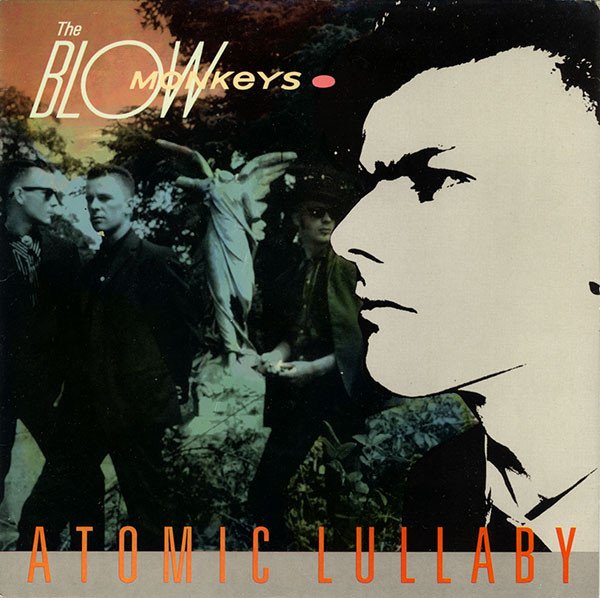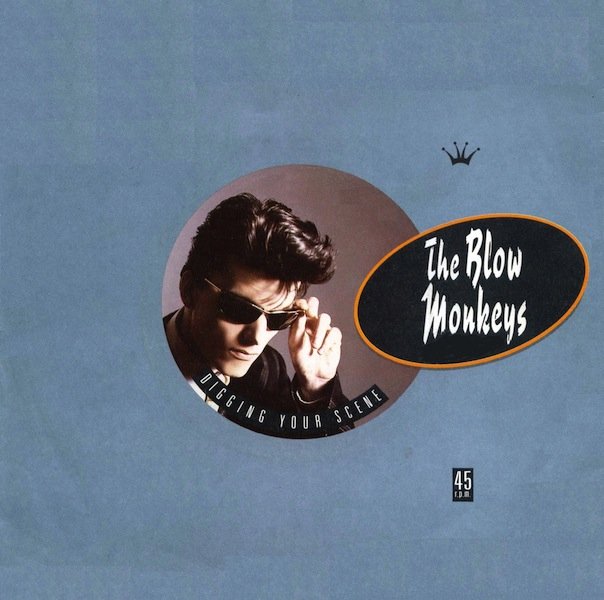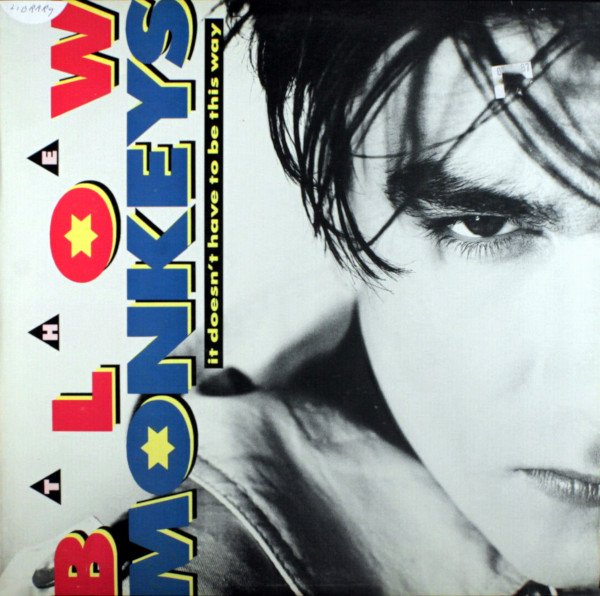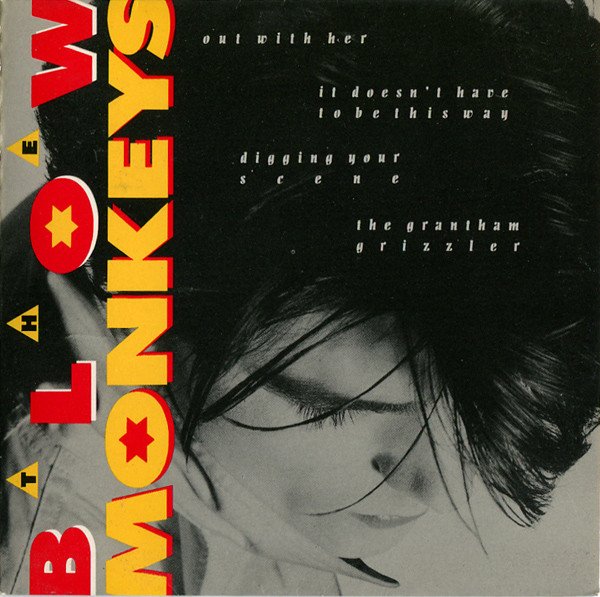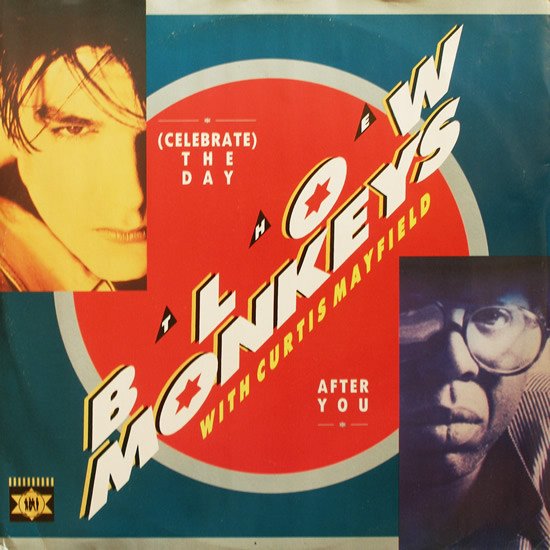Biography
With hits like ‘Digging Your Scene’ and ‘It Doesn’t Have To Be This Way’, The Blow Monkeys epitomised the glamour of mid-80s pop at its most graceful and sophisticated. In the band’s frontman Robert Howard (aka Dr. Robert), they possessed a tall, charismatic singer who was both camera-friendly and clever, who appeared to be just as much at ease on the catwalk that is pop’s conveyer belt as he was penning witty, incisive songs. While quite clearly Robert’s band, though, the Blow Monkeys were also gifted three immensely talented musicians in bassist Mick Anker (he of the trademark bowler hat), saxophonist Neville Henry and drummer Tony Kiley.
Behind the band’s stylish veneer lay something else, which became increasingly apparent from Robert’s lyrics. While some of the Smash Hits generation avoided politics with a capital P, The Blow Monkeys openly criticised the policies of the Conservative government, railing against social injustices and adopting an openly left-of-centre stance on issues of the day. From openly endorsing the gay community “Digging Your Scene” to an outright attack on Margaret Thatcher ‘Celebrate (The Day After You)’ – a duet with the late, great Curtis Mayfield, The Blow Monkeys were always the thinking person’s pop group.
As the 1980s progressed, so too did the band’s musical style, from a sound once dubbed “jazz punk” by Robert to a more soulful, jazzy style and an ever-increasing adoption of dance music. The Blow Monkeys of their rare, indie debut single ‘Live Today Love Tomorrow’ (recorded on a shoestring in 1981) would be barely recognisable to those who bought the Balearic remix of ‘La Passionara’ from 1990. And yet a soulful, spiritually uplifting strain has continued to run through their music – and, indeed, that of Robert’s solo recordings – to this day.
If The Blow Monkeys initially seemed at odds with the music scene, that might be because their frontman/songwriter had lived halfway across the world. “Before moving to Sydney, I had been a T Rex fanatic and a soul fan living in Kings Lynn – “My first hero was Marc Bolan” explains Robert. “The idea of staying in Sydney and trying to make something from there wasn’t an option. I decided it was a toss-up between going to London or New York. Landed just in time for first riots in Brixton in ’81.” Having answered an ad in Melody Maker, The Blow Monkeys were born and Robert Howard transmogrified into Dr. Robert (from the Beatles song). “It started off as a joke on the sleeve of our first single,” laughs Robert. “But it stuck!”
The band’s eccentric early performances stirred up enough interest to secure a deal. “Eventually, we managed to get the Moonlight Club in West Hampstead to give us a residency,” recalls Robert. Jack Steven signed us for RCA and then promptly left. Luckily, a new junior in the office called Korda Marshall took us under his wing. He ended up as head of Warners.”
The Blow Monkeys’ debut album, 1984’s ‘Limping For A Generation’, was an edgy mix of sinister post-punk, sensual glam rock and dramatic late 60s pop, melding Robert’s teenage obsession with Marc Bolan and T Rex with a love of Australian band the Laughing Clowns, a legacy of his teenage years spent ‘down under’. Critically acclaimed, the album secured the band a cult following and spawned several singles. The ambitious ‘Atomic Lullaby’ took a leaf from Love’s Forever Changes album in its delicate mix of strings and arpeggio guitar and its dramatic build to a (literally) explosive climax. Equally potent was ‘Wildflower’, a brash and sexy ode to an ex-lover which just oozed class. “It was written about a girl I knew,” admits Robert. “It’s all in the lyric and it’s a true story.”
Despite only modest sales of their debut LP, RCA clearly saw huge potential in the band – and it paid off. Their sole release of 1985, ‘Forbidden Fruit’, introduced a more confident, well-rounded sound. “We knew we were getting better,” admits Robert. “A key song for us. The first song critics really ‘liked’ and the first we ever put out in the USA. Picked up a good college following. The video was a change, though. Dancing with a pretty girl. Slippery slope!”
Their next album, ‘Animal Magic’ (1986), proved to be their breakthrough courtesy of the hit single ‘Digging Your Scene’. Actually, the song was something of an afterthought on Robert’s part but RCA recognised its appeal and, in a bid to modernise their sound, overlaid new drums in New York using a (then pioneering) Linn machine. A beguiling blend of R&B, pop and jazz, ‘Digging Your Scene’ proved to be popular across the globe – and might remain their calling card to this day.
“That was the last song [on the album] I wrote and I just did a four-track home demo for the band to hear,” explains Robert. “It was the first time we started using backing singers. The soul side of my writing was coming to the fore, listening to lots of Marvin. I’d read an article where Donna Summer said AIDS was God’s revenge on homosexuals and I disagreed! The song itself was a homage to those gay clubs like Taboo that I used to go to – even though I’m not gay – because the music and the vibe was so good. You would see everyone from Leigh Bowery to Mark E. Smith there.”
A smoother assemblage than before, ‘Animal Magic’ was free from the rough edges and the vague sense of threat of its predecessor. Robert openly admitted he’d been listening to a lot of 70s soul and funk, the likes of Curtis Mayfield and Marvin Gaye, which he’d initially loved as a youngster. “When I came back to England, I got back into what I used to be into as a teenager – which was soul music,” explains Robert. “I shared this flat above Red Records in Brixton with a guy called Hector, who had a DJ’ing residency at the Wag club in Soho. I was exposed to so much music, especially early hip hop and house, lots of African stuff and reggae. I was like a sponge, soaking up everything musically and culturally that I was exposed to in Brixton. It politicised me more too.”
‘Digging Your Scene’ also broke the USA for The Blow Monkeys though Robert claims to have been unfazed by this success. “I took it all in my stride. I don’t think I realised what a big deal it was but obviously I enjoyed it! A lot of our contemporaries didn’t crack America so we were lucky. I could never really understand why. Everything was a bit of a surprise to me but I loved it because 90% of the music that I’m into comes from America so it was fantastic to get over there and see it. When you’ve got a major record company backing you, for a while there you feel like royalty – but I wanted to be my own person.”
Subsequent singles such as ‘Wicked Ways’ betrayed their debt to black America, albeit given The Blow Monkeys’ own unique treatment; on ‘Sweet Murder’, Robert duetted with Jamaican toaster Eek-A-Mouse, a union inspired by nights out in Brixton’s reggae clubs. Representing that era here is the B-side of ‘Wicked Ways’, ‘Walking The Bluebeat’ which, according to Robert, was “about moving into Brixton on the day of the riots in ’84 – most people were trying to get out!”.
The title of the Blow Monkeys’ next album, ‘She Was Only a Grocer's Daughter’, might have been a sideways swipe at Margaret Thatcher but that didn’t hurt its commercial appeal any. ‘It Doesn't Have To Be This Way’ gave them their biggest-ever UK hit (it also graced the soundtrack of Police Academy 4: Citizens on Patrol), but operational problems Stateside stymied its success there. “The only song I've ever written that I absolutely knew was a hit from the off,” is how Robert describes the song, “criminally never released in the USA because of internal politics at RCA.”
‘Out With Her’ (“my George Michael moment – rubbish”!), ‘Some Kind Of Wonderful’ and the rousing collaboration with Curtis Mayfield, ‘Celebrate (The Day After You)’, were all converted from LP tracks into Top 75 singles. Sadly, the last of these was banned by the Beeb because it coincided with a general election. For Robert, it was naturally a thrill to work with one of his musical heroes. “What can you say: massive honour. Spent some time with the great man in Montreux doing TV shows. He was very gentle but with a backbone of steel. He wasn't surprised when the BBC banned this record. He'd been through that stuff before.”
That same year, 1987, the Blow Monkeys participated in Red Wedge, a well-meaning aggregation of left-wing pop stars and politicians who embarked on a tour of Britain in a bid to help educate young people about the issues of the day. For the band, it felt like a logical extension of singing from the conscience.”
By contrast, the band were asked to contribute to the soundtrack for the film ‘Dirty Dancing’. Given the shortest of sessions, the band chose to cover Leslie Gore’s ‘You Don't Own Me’ and thought nothing of it – until the movie became the biggest-grossing film of its time and the soundtrack stayed at No. 1 on the US charts for a staggering 18 weeks! “Recorded one morning in a hurry,” says Robert of the project. “Went on to sell over 40 million as the soundtrack inexplicably – to me, anyway – went ballistic. I have never seen the film. The guy who wrote it actually hated our version. Think he liked the royalties, though!
After a couple of minor hits in 1988 (‘This Is Your Life’, ‘It Pays To Belong’), the Blow Monkeys returned to the Top 10 with ‘Wait’. Or rather, they didn’t – because ‘Wait’ was credited to ‘Dr. Robert from the Blow Monkeys & Kym Mazelle’. The track was a blatant tribute to American house music – indeed, it was mixed by two pioneers of Detroit techno, Juan Atkins and Kevin Saunderson – while Mazelle was a star of the Chicago house scene – and yet worked on its own terms. Robert explains that they “originally recorded a version with Sam Brown but her record company rejected it. Some say it was one of the first UK garage records but I couldn't comment. I knew about Kym from those early Marshall Jefferson records.”
‘Wait’ was the third single from the band’s early 1989 album ‘Whoops! There Goes the Neighbourhood’. Although the album fell shy sales wise, RCA reinvigorated the band’s sales potential later that year ‘Choices – The Singles Collection’, which reached the Top 5 in the UK. Meanwhile, ‘This Is Your Life’ – suitably remixed by Ten City – and two singles with reggae singer Sylvia Tella, ‘Choice?’ and ‘Slaves No More’ (“stand-alone single that went unnoticed, a personal fave”), helped remould the Blow Monkeys firmly as a dance act. “I was on a roll at this point,” explains Robert, “producing and writing everything on piano – which is unusual for me. Even Billy Bragg liked ‘Choice?’.”
This transformation was completed in 1990 with ‘Springtime For The World’. At the start of the new decade, dance music felt like the future and The Blow Monkeys offered their own, quite unique twist on it. An ambitious exercise, the LP was not only their longest but also their least successful – despite the clubland success of ‘La Passionara’ (Robert: “I have always been drawn towards things Iberian”), and the huge potential of the uplifting, anthemic title track, which was released as a single but somehow missed out. “Should have been a hit,” reflects Robert. “When it wasn't, I knew it was time to move on. Baggy Madchester was on the horizon and it was time for a change.”
Another of the LP’s highlights was ‘Be Not Afraid’, sung in Arabic by Algeria's popular ‘primo Raï’ performer, Cheb Khaled. “He came in with a cigar in one hand and a shot of whiskey in the other and proceeded to sing this in one take,” remembers Robert. “Astonishing guy. Proper rock and roll rebel, an outsider – he couldn't go home to Algeria because he had made too many enemies.”
Soon afterwards, The Blow Monkeys split up, having enjoyed the previous seven years or so touring the world, creating five remarkable albums and littering the walls of many a teenage girl courtesy of their many hits and Robert’s striking good looks. For nearly two decades, the band was put on ice…
By this time, Robert had befriended Paul Weller, whose own musical path with The Style Council all but mirrored that of The Blow Monkeys. Robert appeared at a Style Council show in 1989; and both collaborated with Paul’s wife and fellow Style Councillor Dee C. Lee on her Slam Slam project. “My wife, Michele, and I moved out to the English countryside (Oxfordshire) with our young family,” explains Robert, “just along from the Manor studios where Weller was recording so I ended up playing lots of stuff on his first three solo albums.”
Seemingly enjoying the freedom to explore new musical avenues, Robert also concocted two solo singles for the Regal Zonophone label as well as creating a new partnership. “I formed an acoustic/electro duo with Benny Staples (ex-Woodentops drummer) called Starjuice,” remembers Robert. “We put out the ‘Catch A Wave’ EP and got a deal to do an album with Japanese label Pony Canyon. Benny left to go back to his native New Zealand just as we were about to start recording so I called up some old friends (Weller, Talbot, Marco from Young Disciples, Alan White) and went to Leamington Spa to make the Realms Of Gold album.”
Post-dance music, Robert and Weller shared a voyage of discovery back to acoustic/roots music of the late 60s and early 70s, from singer-songwriters like Neil Young to the later work of Stevie Winwood’s Traffic. “I had put down the computer and picked up the acoustic guitar. Inspired by Tim Hardin, Fred Neil, Nick Drake, Dylan, early Bolan, etc. Open tunings and biographical songs. I did some serious listening and exploring. I needed to educate myself. Musical archaeology. Did lots of solo acoustic gigs. Just put the guitar in the boot and off we went. Loved it.”
This more organic, solo, guitar-based vibe characterised Dr. Robert’s solo recordings across the 1990s. The title of 1995’s poignant and atmospheric ‘Circular Quay’ harked back to Robert’s youth back in Sydney (“Weller played lovely piano”, adds Robert). ‘The Coming Of Grace’ was a fully-blown band effort, a joyous and spiritually uplifting anthem so could so easily have engaged with the Britpop generation (though it was a “proper radio hit”). Both were taken from Robert’s solo debut ‘Realms Of Gold’, issued in Japan in 1994. Collaborators included ex-Special AKA singer Rhoda Dakar and Young Disciple bassist Marco Nelson.
‘Realms Of Gold’ remains a remarkable accomplishment. ‘Ode To Bacchus’ was “a drinking song: I was never an alcoholic but in the end it nearly killed me and this song seems to predict that”; ‘Don’t Let It Slip’ was “a self-help mantra, actually taken from a radio session in Tokyo”; and on the extravaganza ‘Have No Roots’, “Weller added lots of bv's, played bass and 12-string guitar”. According to its creator, the title track itself was “my Keats-inspired manifesto, recorded at Abbey Road with a proper big orchestra”.
‘The Coming Of Grace’ B-side ‘Lucifer’s Friend’ also appears here. “A friend, Paolo Hewitt, said it reminded him of The Jam’s 'But I'm Different Now’,” Robert reveals. “I mentioned this to Weller, who said he got the idea for that from ‘Dr. Robert’ by Beatles. Thus the circle was completed!”
By the time ‘Realms Of Gold’ was finally unveiled in the UK in 1996, Robert had already created a second album for the Japanese market. Named after the small North Wales village in which it was recorded, in the shadow of Mount Snowdon, ‘Bethesda’ began life as a clutch of demos with future Oasis drummer Alan White and ex-Style Councillor organist Mick Talbot in tow. A candid collection, ‘Bethesda’ was a best-kept secret at the time. Thankfully, ‘This Is Nowhere’ (“sometimes I hated the English countryside – part of me still wants to live in Old Compton Street!”) and ‘Halfway To Heaven’ enjoy wider exposure here. “Alan left a week after this to join Oasis, who were No. 1 at the time,” laughs Robert. “I told him not to do it!”
Recorded live in an energetic four-day session at The Chapel Studios in Lincolnshire, ‘Other Folk’ was an aptly-named covers album, interpreting songs by the likes of Fred Neil, Marc Bolan, Curtis Mayfield, Bob Dylan and the Laughing Clowns’ Ed Kuepper alongside a handful of Robert’s own compositions (including a reworking of ‘Halfway To Heaven’). It also saw a welcome return for Blow Monkeys bassist Mick Anker.
1999’s ‘Flatlands’ album was very much a DIY affair, recorded in Robert’s makeshift studio and issued on his own Fencat label. “I made the album on a quarter-inch 8-track at home,” adds Robert. The album’s concept was also both heartfelt and personal, named after and based around myths and stories recalled from his Fenland upbringing in East Anglia. “I had moved back to The Fens at this point.
The misty dyke and pike-filled homelands of my youth.” The album’s represented here by the single ‘Staring Down The Bird’, ‘The Sky Is Falling’ (harking back to Robert’s Celtic roots – he was born in Scotland), ‘Further Adventures Of The Fen Tiger’ (“my paean to Kings Lynn and … er… speedway”), the title track and the moving song ‘I Can't Remember The Last Time I Cried’. “A personal fave,” admits its author. “Sometimes, it was very lonely out on the margins and without my amazing friend and wife Michele I doubt I would have made it. She basically co-produced this album.” By this time Michele was full time managing Robert as a solo artist and went on to manage the reformed Blow Monkeys form 2012 onward. The Renaissance years.
Robert returned to Bethesda’s Bryn Derwen Studios for ‘Birds Gotta Fly’ (2001). A more upbeat, modern affair than much of his 90s output, drawing on local musicians and the emotive violins of Nell
Catchpole. It boasted the single ‘A Single Summer’ “ – (“a Hassidic rave up with dancing violins and open tuned guitars”), ‘Sycamore Tree’ (“a day spent in contemplation at the tree that killed Bolan”), the glorious title track and the boogie pulse of ‘Blue Skies’, with help from Marius de Vries: “We had given him his first break in show-business – he was now Mr. Bafta!”.
Later that year, Robert and family emigrated to Spain and adopted a somewhat lower profile. “It was time to move on again,” explains Howard. “Michele and I have both always been nomads. It was interesting to revisit my youthful haunts but the homogenisation of English villages and towns was becoming depressing.” After collating a rarities album, ‘Keep On Digging for The Gold’ (2002) and committing to an in-concert release ‘Live In Tokyo (2004), he kept relatively quiet until his collaboration with his neighbour in Spain, P.P. Arnold. Unfortunately, the resulting album ‘Five In The Afternoon’ was stymied by problems with the record label.
The Blow Monkeys finally returned in 2008 with a new album ‘Devil's Tavern’. While harking back to the early 80s pre-dance music roots of the band, the songs oozed maturity as if Robert’s writing had been seasoned by their years apart. Have a listen to ‘Save Me’, “recorded in southern Spain on a hot summer’s night”. The following year, the band celebrated their reunion with a live CD/DVD package, ‘Travelin' Souls - Live! at the Legendary 100 Club’.
Their second album after reforming was the more upbeat ‘Staring At The Sea’ (2011) was promoted by a new single, ‘Steppin' Down’. The title track, however, was about a subject which was very personal to Robert. “It’s a song about my father, who died when I was 16. Memories of spending cold wet windy days eating fish and chips in a car whilst the rain lashed at the windscreen and we gazed out to sea saying nothing – a very peculiar English relationship with the sea.”
And in spring 2013, the Blow Monkeys unveiled their third studio album since reforming: ‘Feels Like A New Morning’ fanfared by the groove-driven anthem ‘Oh My’.
Recorded and mixed at Bryn Derwen Studios, North Wales, in a whirlwind eight days (as Howard says… “It shows in a good way - no tinkering”) ‘Feels Like A New Morning’ was met with universal praise for its vitality and freshness .. and of courses the songs. Always the songs.
In 2015 the group takes a great big leap forward with a brand new recording ‘If Not Now, When?’
Robert said of the album, “The songs were born of my absolute love of early rock and roll and kings like Eddie Cochran and, of course, Chuck Berry, and also lots of early Doo Wop. I wanted it to swing; no middle-eights, short, sharp solos, lots of baritone sax and boogie guitars. It’s a glam-soul stomper! In many ways it’s a return to the music that first opened my world. I’ve never forgotten that feeling.”
As the sole writer and producer of ‘If Not Now, When?’ , Robert has this to say: “We weren’t interested in pastiche or recreating something. It’s music that comes from a place of love and joy and, as the late great Pete Seeger once said, we are all links in the chain.”
The Blow Monkeys released their 10th studio album “The Wild River” on October 6th 2017 on Monk’s Road Records. “The Wild River” was recorded in Spain and produced by Dr Robert. The 10 tracks deliver a funky soulful extravaganza with added sugar from the sweet soul strings of Ben Trigg and the inimitable iconic saxophone of Neville Henry. Also joining the band for the first time on record is ex Galliano sticksman Crispin “The Pump” Taylor. Add Dr Robert’s spiky guitar and distinctive vocals and Mick Anker’s snaking bass lines and there you have it. A simian soul stew with biting but poetic lyrics designed to make your feet move and your mind wonder…
And so to ‘Journey To You’ (Oct 2021). 40 years down the line and they record something as brilliant as this! ‘Journey To You’ featured the No 1 single ‘Time Storm’ and is packed full of classic such as ‘Dust At Her Feet’ and ‘Each & Every One’ it showcases their distinctive brand of ‘Simian Soul’ laced with a new strident ‘Bacharach and David’ sensibility underpinned by funky irresistible groove and outrageous string arrangements.
Written and produced by main man Dr Robert. “These songs were written in a kind of frenzy during the initial weeks of the first lockdown” says Robert “When it was still a bit of a novelty. An enforced place of peace. Something new happened for me. My voice changed and the music that was coming was very ‘up’ very positive. I just went with it”.
2023 saw the release of a new compilation on Glasgow imprint ‘Last Night From Glasgow’. ‘Time Storm - Greatest Hits Vol 2’ brought together some of the amazing music the band have made since reforming in one glorious collection.
And now in 2024 a new album. “Together /Alone”
Robert describes the album process, noting Bob Dylan quote “I was born here and I’ll die here… against my will” as a key starting point in the themes of the project: “If we are lucky, we get to spend time with loved ones along the way. It’s about the journey not the destination. It’s taken a lifetime for me to understand that. I’ve been incredibly lucky to share much of my life with Michele who has opened my eyes to so much of the world.”
The album embraces simplicity while keeping their sound distinctively infectious and made to be played live: “Musically we wanted something stripped down ...raw and funky. We’ve played an awful lot of gigs over the last few years, and I knew how good we could sound without all the embellishments. Can’t wait to get out and play it to people - it’s still the most fulfilling part of the job. The communion with audience where just for a moment we all become one”.
And so the journey continues. Since reforming in 2008 The Blow Monkeys have been incredibly productive releasing eight new albums and playing hundreds of concerts. These Monkeys continue to evolve. From their beginnings on the underground club scene right through to their appearance on the biggest selling soundtrack of all time “Dirty Dancing” (You Don’t Own Me) and beyond. Long may they swing.
Linktree: https://linktr.ee/theblowmonkeys.com
Management: Michele Howard: michele@theblowmonkeys.com
Alan McGee: alanmcg2004@aol.com
INTERVIEWS/PHOTOS/BIOGRAPHY – AVAILABLE ON REQUEST

